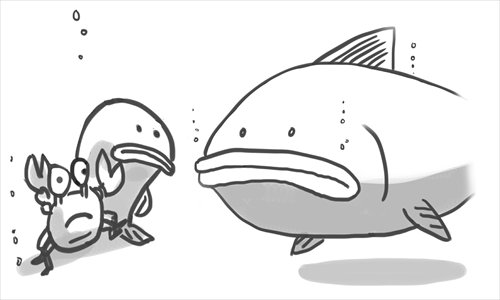China not target of India’s oceanic efforts

Illustration: Liu Rui/GT
Prime Minister Narendra Modi has started his five-day Indian ocean-nation tour since Tuesday. Modi's active Indian Ocean diplomacy demonstrates that India is trying to improve its relations with its oceanic neighbors and maximize national interests in this region.
Modi will be visiting Seychelles and hold bilateral discussions with Seychelles' President James Alix Michel on Wednesday to strengthen the bilateral maritime ties. Then, he will go to Mauritius to attend their National Day celebrations. At last, he will fly to Sri Lanka to conduct the first bilateral visit by an Indian Prime Minister in over 25 years. Modi was also scheduled to visit the Maldives on March 15 as the final stop of his Indian Ocean foray but canceled it at the last moment due to the political unrest in the islands.
Evidently, the Indian leader wants to confirm that Delhi is putting greater emphasis on the Indian Ocean. Predictably, Modi will boost cooperation with India's maritime neighbors. Apart from offering economic assistance and enhancing economic cooperation, he will probably place great importance on defense and security cooperation.
The Indian media reported that India would offer a broad range of military assistance to its neighbors in the Indian Ocean. Recently, Indian defense officials have said that India has a role as a net security provider in the Indian Ocean region and India is providing patrol ships, surveillance radars and ocean mapping for the island states.
In addition, Modi will presumably emphasize the "unique" historical and cultural ties between India and its neighbors. For example, as part of his Sir Lanka itinerary, Modi will visit Anuradhapura, a World Heritage Site that has been a center of Theravada Buddhism for many centuries, to project the country's Buddhist links in the region.
China is also an important factor in Modi's Indian Ocean diplomacy. Many Indian analysts have publicly argued that the main purpose of Modi's intent to ramp up help for Indian Ocean nations is to counter China.
In recent years, India's worries about China's influence in the Indian Ocean have increased. From the Indian perspective, India plays a major role in the ocean and China's rising profile could eventually undermine India's preeminence. Some Indian experts predicted China would potentially become an economic and security threat and suggested India should use its history, culture and geography to compete with China.
According to Indian media reports, India is pushing a "Mausam" project to compete with China's "21st century Maritime Silk Road." The "Mausam" project is trying to allow India to reestablish its ties with its ancient trade partners and reestablish an Indian Ocean "world" along the littoral of the Indian Ocean.
It is true that the "China factor" cannot be neglected when people clarify the intentions of India's diplomatic actions, but it is not reasonable to over-emphasize it. Sino-Indian relations are not engaged in a zero-sum game, even though the two sides' interests in the region are not asymmetric.
Actually, in recent years, both nations have been willing to move forward their strategic partnerships. The two sides have increased the bilateral and multilateral interactions, including Chinese President Xi Jinping's visit to India last September and Modi's upcoming travel to China this May. Indeed, as the two biggest powers around the Indian Ocean, China and India should act in a positive way and conduct related regional cooperation. It will benefit this region and the rest of Asia as well.
If possible, China and India should conduct more strategic dialogues concerning regional security and economic development and ensure mutual trust.
Modi should be prudent to avoid raising issues which could result in an "India or China" dilemma. Similarly, China should address doubts about the motivations of China's foreign policy in the region, and particularly India's worries about the "China threat."
The author is an assistant research fellow at the Institute of South Asian Studies, Sichuan University. opinion@globaltimes.com.cn